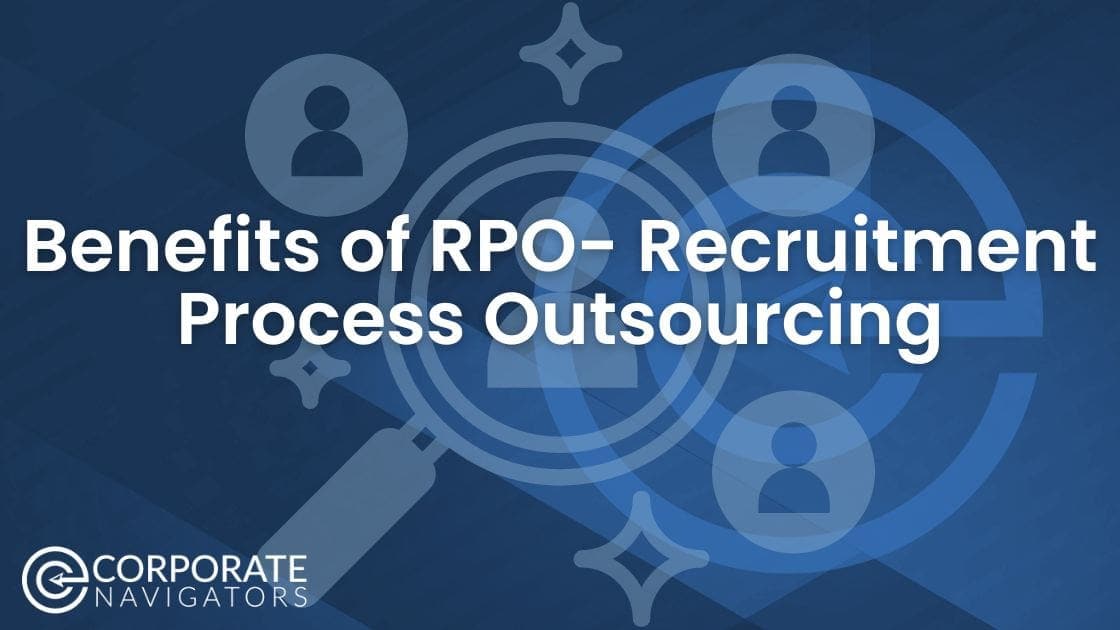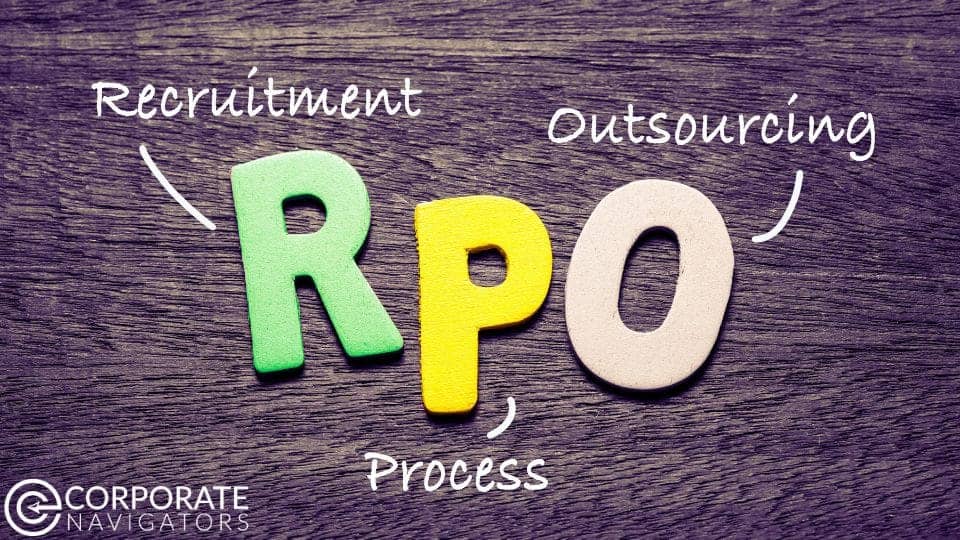
Table of Contents
The Benefits of RPO (Recruitment Process Outsourcing)
Is RPO right for your candidate search? This strategic approach allows you to delegate part or all of the necessary recruitment functions to an external specialist provider. Typical recruitment functions include searching for talent, screening candidates, candidate sourcing, and more, as an end-to-end service or a-la-carte “on demand” service.
An RPO partnership allows companies to streamline their hiring processes, saving them time and money. It also helps them leverage the expertise of recruitment professionals and utilize advanced technology while focusing their internal resources on core business activities.
By outsourcing recruitment to meet staffing needs, companies can enhance their talent acquisition strategies, be more efficient, and maximize their chance at achieving better hiring outcomes. If you need a flexible and scalable solution tailored to meet the unique needs of businesses, working with a company that offers full-cycle or singular RPO services charged by the hour, can be right for you.
There is also another way!
Alternatively, Recruitment Research Firms like Corporate Navigators can conduct core recruitment services for you, such as research, candidate sourcing, candidate sourcing, org chart generation, and more, saving you a lot of time and hassle.
What is RPO?
Recruitment Process Outsourcing (RPO) is a business practice in which an external provider conducts all or part of the recruitment process on behalf of a client. The provider acts as an extension of the company’s HR or recruitment function, offering various recruitment solutions such as sourcing quality candidates and building a talent pipeline.
Based on the client’s specific needs, an RPO company can manage some or all aspects of the hiring process. Here’s a breakdown of what this service typically involves:
Key Components of RPO
RPO service providers can offer various services to assist their clients with outsourced recruitment needs. Here are some examples of key RPO components.
1. Full-Scope RPO
The RPO provider handles the entire recruitment process from start to finish, including job requisition, candidate sourcing, screening, interviewing, and onboarding.
2. Partial RPO
Service providers manage specific parts of the recruitment process, such as sourcing candidates, handling the initial screening, or managing the recruitment technology. This can be ordered on a short-term hourly basis or long-term contract plan. Corporate Navigators’ hourly service plans are a good example of this.
3. Recruitment Research
In this segment of RPO, the provider can source candidates and screen these contacts to find out which ones are on-target and interested for the open position. This segment also includes org chart generation, competitive intelligence, and overall market research for goal planning.
- Note: Recruiting Research Firms provide all services related to this segment at competitive hourly and contract rates. Contact Corporate Navigators to find out how to get this service if you want to outsource the core of Recruitment tasks and leave the final stretch of the process (onboarding, interviews) in-house.
4. Branding and Marketing
The RPO partner can help the client develop and implement recruitment marketing strategies, including employer branding and talent acquisition planning. In 2025, trends point to more companies focusing on brand image to attract the best talent.
5. Technology and Tools
Providers can also offer advanced recruitment technologies and tools, such as Applicant Tracking Systems (ATS), to streamline the recruitment process. This can help in-house talent acquisition teams navigate the talent market with the support of the RPO provider.
6. Compliance and Reporting
RPO recruitment services often ensure compliance with labor laws and regulations while providing detailed reporting and analytics on recruitment metrics. Both compliance and reporting services offer peace of mind and keeps everyone on the same page.

The Benefits of RPO
To meet hiring demands, companies of all sizes can benefit from an recruitment process outsourcing company. Whether they need partial or full cycle services, outsourcing these tasks can augment in-house HR teams or become a stand-alone solution for a company without any in-house recruitment professionals onboard.
1. Expertise and Efficiency
Providers bring specialized knowledge and experience, which can lead to more efficient and effective recruitment processes. In this capacity, an outsourced RPO team can augment your in-house talent acquisition and retention teams, especially if there are individuals who need to gain experience in this field in your ranks.
2. Scalability
You can scale your recruitment process outsourcing needs up or down based on your company’s hiring needs, making it a flexible option for businesses experiencing growth or fluctuations in recruitment demand. For instance, if there is suddenly a higher than normal recruitment need, a hiring manager can call an RPO company and ask for assistance with high-volume recruitment needs.
3. Cost Savings
By outsourcing recruitment processes, the recruitment process can be more cost-effective. Specifically, companies can reduce costs associated with in-house recruiting, such as recruitment advertising, internal staff salaries, and technology investments since they can take care of these tasks on demand.
4. Access to Talent
RPO providers often have extensive networks and advanced tools to attract and identify top talent, improving the quality of hires. They can also provide detailed information about candidates that are difficult to find on social media or on a resume. For example, at Corporate Navigators, we can provide detailed notes after calling into companies to find out how long someone has been working there and what their specialities are.

Choosing an RPO Provider
When selecting an provider, companies should consider factors such as the provider’s expertise in their industry, the flexibility of their services, their technology offerings, and their track record in delivering successful recruitment outcomes.
The right solution can significantly enhance a company’s ability to attract, hire, and retain top talent. Check out their case studies, online reviews, service offerings, pricing models, and track record before committing to an RPO company.
Can You Choose Parts of RPO instead of Full-Cycle?
Yes, Recruitment Process Outsourcing can definitely be done in parts. In fact, it’s pretty common for companies to outsource specific segments of their recruitment process rather than the entire function. By breaking down the recruitment process and outsourcing specific parts, companies can tailor the RPO solution to meet their unique needs and objectives. This approach can also offer flexibility and cost-efficiency. Here are some common ways RPO can be segmented:
Ways Recruitment Process Outsourcing Can Be Segmented
1. Talent Sourcing
Outsourcing candidate sourcing can help you access a broader talent pool and take advantage of advanced sourcing techniques without committing to full recruitment process outsourcing. This works great if you have someone available in-house to call a list of sourced candidates and conduct interviews.
2. Screening and Shortlisting
You might choose to outsource the initial screening and shortlisting of candidates while keeping the final interviewing and selection process in-house. This can save time by weeding out unqualified candidates without using too much of your onsite team’s efforts.
3. Recruitment Technology Management
Outsourcing the management of recruitment technology and systems can help you get the benefits of talent management platforms without the need for internal expertise or resources. Using this service can be beneficial in your workforce planning by keeping qualified candidates in your back pocket.
4. Onboarding Candidates
As you know, onboarding takes a considerable amount of time that not every company has, especially when teams are small. Therefore, some organizations opt to outsource the onboarding process to ensure a smooth transition for new hires, while managing other recruitment activities internally. This benefits the new hire since they get the attention and assistance they need to onboard while maximizing the way the hiring company uses its time and resources.
5. Employer Branding
Companies may outsource the development and management of employer branding strategies to attract talent, while handling the actual recruitment internally. With employer branding becoming a strong factor that quality talent considers before joining a company, more companies are prioritizing their branding and company culture into 2025.
6. Compliance and Administration
Laws regarding employment are complex and ever-changing, which makes it difficult for time-strapped acquisition teams to focus on them. Letting experts from recruitment process outsourcing companies handle compliance with employment laws and recruitment administration tasks makes it easier for internal teams to focus on more strategic aspects of recruitment.

RPO v.s. BPO
Recruitment process outsourcing is not to be confused with BPO, or business process outsourcing. While they are both forms of outsourcing, they focus on different areas of business operations. Here’s a comparison to help clarify the distinctions:
Recruitment Process Outsourcing
Recruitment process outsourcing focuses on the recruitment process, including job requisition, candidate sourcing, screening, interviewing, and onboarding.The primary goal is to improve the efficiency and effectiveness of hiring practices, access specialized recruitment expertise, and ensure the best talent is attracted and retained. RPO providers often act as an extension of a company’s HR team, often integrating closely with the company’s culture and recruitment strategy.
Business Process Outsourcing
BPO covers a wide range of non-core business processes beyond recruitment, such as customer service, finance and accounting, IT support, and more. It can involve entire business functions or specific processes within those functions. For example, outsourcing all customer service operations or just the help desk component.The primary goal of BPO is to reduce costs, enhance operational efficiency, and focus internal resources on core business activities.
Understanding these distinctions can help companies make informed decisions about which type of outsourcing best meets their needs and aligns with their business goals.
The Benefits of Using an RPO Provider ( or Recruiting Research Firm)
Whether you need to manage specific aspects of recruitment like branding, or the entire hiring process, full or partial RPO can augment the talent acquisition process. By partnering with an RPO provider, companies gain access to specialized expertise, advanced recruitment technologies, and scalable solutions tailored to their unique needs. This not only streamlines the hiring process but also improves the quality of hires, reduces time-to-fill, and ensures compliance with regulatory standards.
What if you just need core recruitment services?
Well, you’re in luck. At Corporate Navigators, our Recruiting Research services cover all the essential tasks related to recruiting qualified talent. We can identify and develop on-target candidates and provide you a list of verified, interested professionals who want to continue the conversation with you. We can also provide you org charts and market research to help you make the best business decisions for your needs.
Contact us today if you want to get started on setting up a recruiting research plan!


